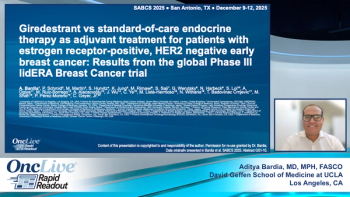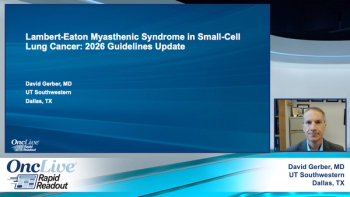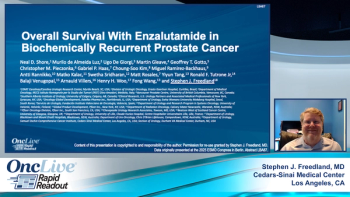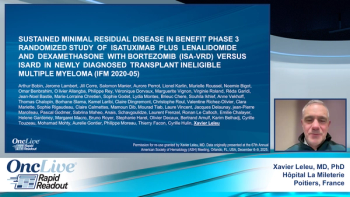
Camrelizumab plus rivoceranib vs sorafenib as first-line therapy for unresectable hepatocellular carcinoma: a randomized, phase 3 trial
Dr. El-Khoueiry evaluates the efficacy and safety of camrelizumab in combination with rivoceranib for the treatment of unresecetable hepatocellular carcinoma in the front-line setting.
Background
- Primary liver cancer is a pronounced health burden globally, ranking sixth in incidence and third in mortality among all cancers with ~906,000 new cases and 830,000 deaths estimated in 2020.
- Hepatocellular carcinoma (HCC) constitutes about 75%-85% of primary liver cancer cases
- The majority of HCCs (~72%) are diagnosed in Asia, with hepatitis B virus (HBV) infection as the most common cause
- The multi-targeted tyrosine kinase inhibitors (TKIs) sorafenib and lenvatinib are the standard first-line treatment for advanced HCC. However, their efficacy is limited with a median overall survival (OS) of approximately 10-15 months.
- Immune checkpoint inhibitors targeting PD-1 or PD-L1 have emerged as new treatment for advanced HCC. Nevertheless, only a small subset of patients with HCC derive response to single agent immunotherapy and no survival gain over sorafenib was observed in the first-line setting.
- Immunotherapy plus an anti-angiogenic TKI has significantly improved survival outcomes in renal cell carcinoma and endometrial carcinoma. However, the survival benefits with this strategy in HCC are yet to be elucidated.
- Camrelizumab, an anti-PD-1 IgG4 antibody, and rivoceranib (apatinib), a small-molecule VEGFR2-targeted TKI, have each demonstrated efficacy and safety in advanced HCC and have been approved as monotherapy in the second-line setting in China
- In a phase 1 study in pretreated HCC, camrelizumab plus rivoceranib showed encouraging preliminary anti-tumor activity and acceptable tolerability
- In a subsequent phase 2 trial in advanced HCC, camrelizumab plus rivoceranib as first-line treatment led to an objective response rate (ORR) of 34.3%, a median progression-free survival (PFS) of 5.7 months and an 18-month OS rate of 58.1%.
- This phase 3 trial (NCT03764293) aimed to compare the efficacy and safety of camrelizumab (C) plus rivoceranib (R) vs. sorafenib (S) as first-line treatment for unresectable HCC.
Methods
- In this international, randomized, open-label, phase III trial, eligible patients (pts) were randomized 1:1 to receive C (200 mg, iv, q2w) + R (250 mg, po, qd) or S (400 mg, po, bid).
- Pts were stratified by macrovascular invasion and/or extrahepatic metastases, geographical region (Asia vs. non-Asia), and baseline serum AFP (<400 vs. ≥ 400 ng/mL).
- The primary endpoints were PFS per RECIST v1.1 criteria by BIRC as well as OS.
- The primary analysis for PFS was done after 339 PFS events occurred (May 10, 2021) and the planned interim analysis of OS was done after 262 deaths occurred (Feb 8, 2022).
Results
- A total of 543 pts (ITT population) were randomized to receive C+R (N=272) or S (N=271) respectively.
- With a median follow-up time of 7.8 mo, PFS was significantly improved with C+R vs. S (median 5.6 mo [95% CI 5.5-6.3] vs. 3.7 mo [2.8-3.7]; HR 0.52 [95% CI 0.41-0.65]); 1-sided p<0.0001).
- With a median follow-up of 14.5 mo, OS was significantly prolonged with C+R vs. S (median 22.1 mo [95% CI 19.1-27.2] vs. 15.2 mo [13.0-18.5]; HR 0.62 [95% CI 0.49-0.80]; 1-sided p<0.0001).
- ORR, DCR and DoR were also better with C+R vs. S
- A pre-specified subgroup analysis showed that HRs of PFS and OS obviously favored C+R in the majority of the subgroups.
- Grade ≥3 TRAEs occurred in 80.9% with C+R and 52.4% with S. TRAE led to discontinuation of any treatment in 24.3% (of both agents in 3.7%) with C+R and 4.5% with S.
- Fatal TRAE occurred in 1 pt in each arm
Conclusions
- This is the first positive international phase 3 study to report significant PFS and OS benefits with the combination of an anti-PD-1/PD-L1 antibody and a small-molecule TKI over sorafenib for unresectable HCC.
- Camrelizumab + rivoceranib provides the longest OS seen in a front-line pivotal phase 3 study in advanced HCC to date.
- OS: median 22.1 mo vs. 15.2 mo; HR 0.62 (95% CI 0.49-0.80); one-sided p <0.0001
- PFS: median 5.6 mo vs. 3.7 mo; HR 0.52 (95% CI 0.41-0.65); one-sided p <0.0001
- PFS and OS generally favored camrelizumab + rivoceranib across subgroups.
- ORR was also significantly improved, and responses were durable with camrelizumab + rivoceranib.
- The combination of camrelizumab + rivoceranib was generally well tolerated, with a safety profile in line with each individual agent and the underlying disease.
- These findings support that camrelizumab + rivoceranib represents another new first-line treatment option for unresectable HCC.
Qin S, Chan LS, Gu S et al. Camrelizumab plus rivoceranib vs sorafenib as first-line therapy for unresectable hepatocellular carcinoma: a randomized, phase 3 trial Abstract presented at: 2022 European Society of Medical Oncology, September 9-13, 2022; Paris, France & Online. Abstract # LBA35. https://oncologypro.esmo.org/meeting-resources/esmo-congress/camrelizumab-c-plus-rivoceranib-r-vs.-sorafenib-s-as-first-line-therapy-for-unresectable-hepatocellular-carcinoma-uhcc-a-randomized-phase






































